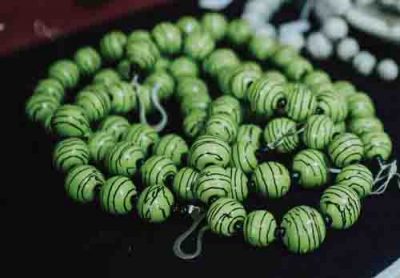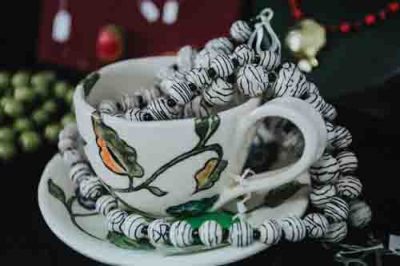
by: Janet Aslin, Assistant Editor
As I stepped into the room filled with elderly artisans, I sensed a friendly, welcoming atmosphere. For the most part, we had no shared language, but I knew each one was happy to be there. Seated at tables in groups of three or four, some were chatting with a neighbor as they worked, while others preferred silent camaraderie—yet all were intent on the task set before them. I had come as part of a tour to visit a very special group of elderly Jerusalemites who have discovered a renewed purpose in their later years at Yad LaKashish (Lifeline for the Old).
She Saw a Need
Over 50 years ago, a school teacher by the name of Myriam Mendilow saw a need and decided to do something about it. The early years of Israel’s statehood were difficult. Forced to focus on defending itself against hostile neighbors and absorbing waves of immigrants, many of whom arrived with just the clothes on their backs, there was no time or energy to consider the needs of its older population. As a result, many of Jerusalem’s elderly were ending up on the street as beggars. Ms. Mendilow was moved by their plight but also concerned by the attitudes she saw in her students—that old people were irrelevant and had nothing useful to contribute to the young state.
Eight men formed the nucleus around which Yad LaKashish would ultimately grow. A tiny book bindery was opened, and the men learned to repair damaged school texts and library books. Relationships developed as the children got to know the men and their dignity was restored as they now saw themselves as men with a purpose in life rather than beggars waiting for handouts from passersby.
A Reason to Get Up in the Morning
Today Yad LaKashish has space for a total of 300 people and nearly all the spots are filled. The average age is around 80; the oldest member is 96 and still going strong! Usually artisans join because they’ve heard from a friend about this wonderful community. And they stay! Currently there are a number of elderly who have been on the job between 20–25 years.
It’s more than a job. I spoke with Tamar, a staff member at Yad LaKashish, who shared the following. “We pay the artisans a small stipend for their work, but I firmly believe that if they were told we could no longer afford to pay them, most would still choose to come. Yad LaKashish gives them a reason to get up in the morning and the feeling of accomplishment when they have handcrafted an item that people from around the world will buy and take home. In addition, they are no longer isolated and enjoy a community of fellow artisans.” One of the keys to this community is a hot lunch each day. Sharing a meal with others takes a big chunk out of the loneliness of living by themselves.
Making a Difference
 From its very beginnings, the goal of Yad LaKashish has been to provide an environment where the elderly can thrive and make a contribution to society. The following account demonstrates the commitment to the elderly artisans who have been entrusted to them. In the words of Ariella Schwartz-Zur, Acting Executive Director, “Our aim and purpose is to give each person the opportunity to do their best; to see that they can do excellent work and can have pride in their accomplishments.”
From its very beginnings, the goal of Yad LaKashish has been to provide an environment where the elderly can thrive and make a contribution to society. The following account demonstrates the commitment to the elderly artisans who have been entrusted to them. In the words of Ariella Schwartz-Zur, Acting Executive Director, “Our aim and purpose is to give each person the opportunity to do their best; to see that they can do excellent work and can have pride in their accomplishments.”
There was an artisan whose health was deteriorating, and the instructor in his workshop noticed that he was struggling to accomplish the task he had been doing for several years. She spent time thinking about how to incorporate his skills into a new project he could be proud of. After several different ideas, she decided to ask him to paint lines on ceramic beads. His lines were a little squiggly instead of straight but when she saw the first necklace made from the beads, she realized that when they were strung together, these beads became a unique and artistic necklace—no two the same!
Come and See!
Located in Jerusalem’s center, near the Old City, a visit to Yad LaKaShish would make an excellent addition to any Jerusalem itinerary. Today there are eleven different workshops where the nearly 300 artisans produce beautiful products for sale in their gift shop. Delicate hand-painted silk fabric, yarn, colorful papier mâché and intricately designed metalwork emerge as wall hangings, prayer shawls, jewelry, toys and clothes for babies and children, recycled paper notebooks and more.
 Each workshop has a professional artist/instructor who develops designs for the products that are created by the elderly artisans. The instructor is available on site to teach as well as answer any questions that may arise. The inventory of the gift shop changes as new products are introduced.
Each workshop has a professional artist/instructor who develops designs for the products that are created by the elderly artisans. The instructor is available on site to teach as well as answer any questions that may arise. The inventory of the gift shop changes as new products are introduced.
One of my favorite stops is the papier mâché workshop. Visitors can follow the process from a wet, sticky mass to its final product—a necklace or a whimsical cat, like the one I fell in love with and took home with me after a recent visit. At each of the workshops, you can see the pride of accomplishment on the faces of these precious Jerusalemites.
Visitors come from within the country as well as tourists from the nations. Recently, I was at the gift shop when a large group of soldiers arrived for their tour. I learned that many visitors are multi-generational; coming because their parents (or grandparents) had toured the facility years before. I believe Yad LaKashish is one of Jerusalem’s hidden treasures. To learn more, or to arrange a visit, their website is www.lifeline.org.il
Editor’s note: Yad LaKashish is one of the organizations Bridges for Peace partners with in Jerusalem. Our Food program provides cookies for their daily tea time. We also deliver our shredded paper to be used in several of the workshops.
Photo Credit: MNagata/Bridges for Peace
All logos and trademarks in this site are property of their respective owner. All other materials are property of Bridges for Peace. Copyright © 2025.
Website Site Design by J-Town Internet Services Ltd. - Based in Jerusalem and Serving the World.